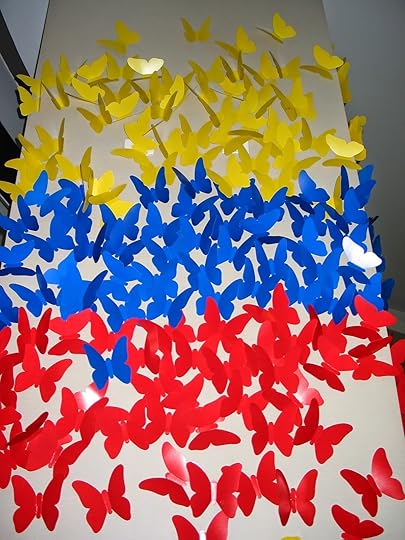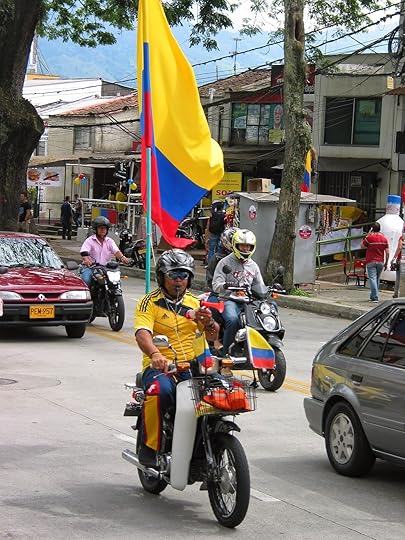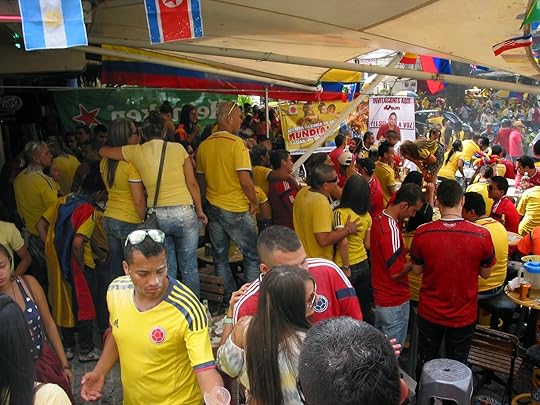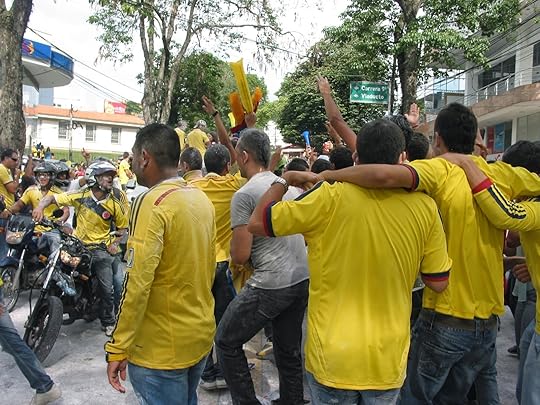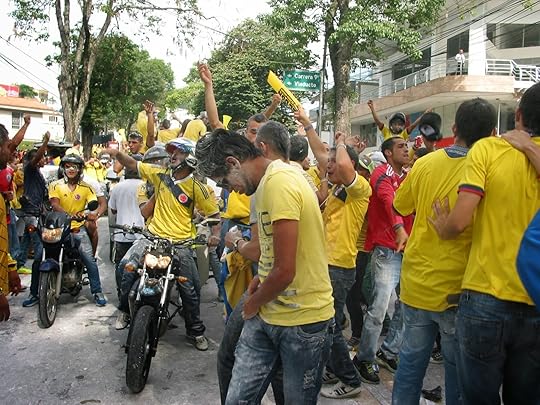Heidi Ayarbe's Blog, page 3
June 19, 2014
Colombia From the Hip ... World Cup Game Two
Colombia versus The Ivory Coast 2 to 1
Phew. Really close one there.
 Colombia in every form ... hats, ponchos, obnoxious horns, flags ...
Colombia in every form ... hats, ponchos, obnoxious horns, flags ...

 The World Cup Version of "The Sorting Hat"
The World Cup Version of "The Sorting Hat"
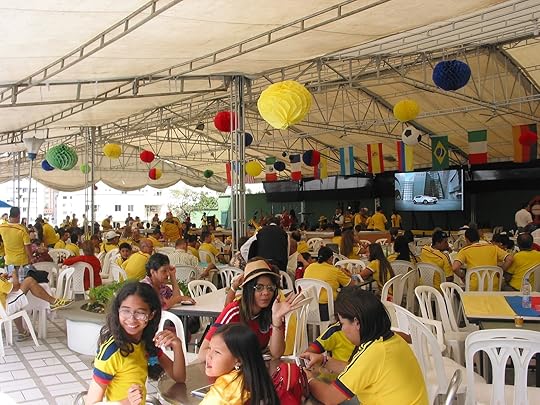 Almost game time at a club nearby.
Almost game time at a club nearby.
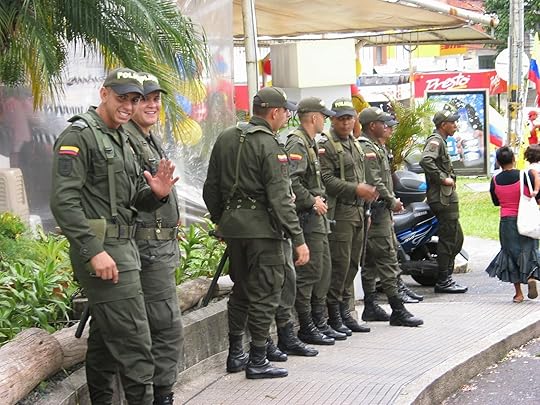 So wouldn't want to be these guys ... Drunk soccer fans. Unpleasant. (Still smiling because it's pre-game)
So wouldn't want to be these guys ... Drunk soccer fans. Unpleasant. (Still smiling because it's pre-game)

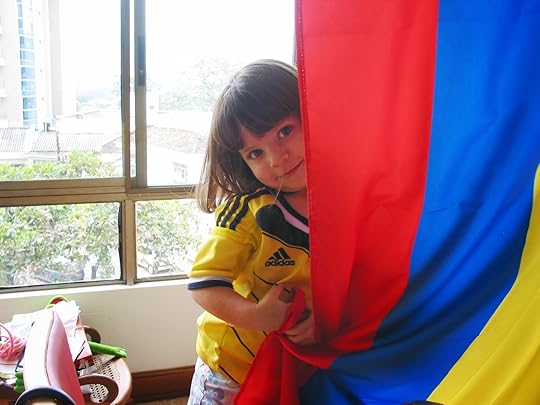 Good luck charm!
Good luck charm!
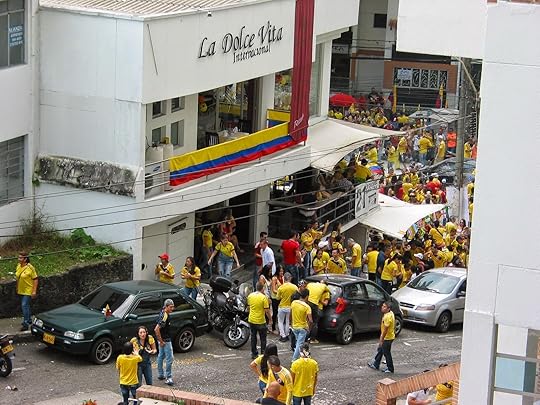 Okay. How many of these guys called in sick to work? On a Thursday afternoon.
Okay. How many of these guys called in sick to work? On a Thursday afternoon.
 Car pool lane!
Car pool lane!
Phew. Really close one there.
 Colombia in every form ... hats, ponchos, obnoxious horns, flags ...
Colombia in every form ... hats, ponchos, obnoxious horns, flags ...
 The World Cup Version of "The Sorting Hat"
The World Cup Version of "The Sorting Hat" Almost game time at a club nearby.
Almost game time at a club nearby. So wouldn't want to be these guys ... Drunk soccer fans. Unpleasant. (Still smiling because it's pre-game)
So wouldn't want to be these guys ... Drunk soccer fans. Unpleasant. (Still smiling because it's pre-game)

 Good luck charm!
Good luck charm! Okay. How many of these guys called in sick to work? On a Thursday afternoon.
Okay. How many of these guys called in sick to work? On a Thursday afternoon. Car pool lane!
Car pool lane!
Published on June 19, 2014 13:59
June 14, 2014
Colombia from the Hip ... World Cup Game One
Published on June 14, 2014 13:32
June 13, 2014
Colombia IS passion ...
A few weeks ago, everyone I knew was talking about the finals of the Conde Godo, biting nails and grinding teeth with every last serve of Santiago Giraldo.He's ranked 37 in the ATP now ... the highest ranked male Colombian in the history of tennis. (Isner's ranked 11, but I'd venture lots of people in the US say, "Isner who?")

Last week, every Colombian I know had their TVs on to watch the last leg of the Giro d'Italia ... and I think pretty much all of us cried when the crowd started to sing the national anthem to celebrate Nairo Quintana and Rigoberto Uran's victories. (First and second place -- a historic day for Colombian sports).
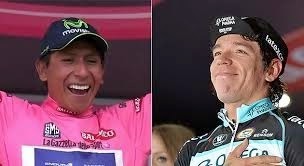
The next day, Colombia's front pages were plastered with Falcao and how he's not going to the world cup. (Tears were shed again). When he initially got hurt earlier this year, this youtube video went viral, loosely translated "God, I know there's a lot of bad stuff going on in the world, but please cure Falcao so he can make lots of goals."
Today, in Amelia's school, all classrooms will be showing the opening ceremonies of the World Cup in Brazil.
And now everybody's waiting for Saturday morning. Work schedules are getting jiggled, changed around. Classes in institutes have been canceled. The entire country will be paralyzed for the 90 minutes of Colombia's first world cup confrontation in 16 years. Yeah. It's a BIG BIG DEAL since Colombia hasn't gone to a World Cup since the era of Pibe Valderrama and Faustino Asprilla (who later became known for his, um, sizable ...nevermind. I think they had to use an Amazonian Bamboo Palm leaf for that cover shot.)
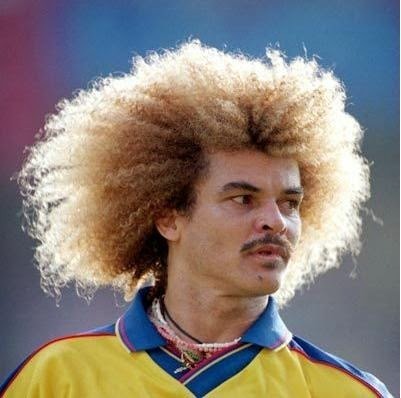

In fact, June 15th are presidential elections and pretty much everybody says that voter turnout and how Colombians vote will depend on the results of the Colombia/Greece game on the 14th. (A little twisted, but it's the reality). There's a story that during a national crises (I don't remember which one) in the 1990s, some TV channels put on an old game between Colombia and Argentina, one in which Colombia won six to zero, to pacify the country. There's a great film called Golpe de Estado based on this game and a guerilla/military group in the mountains that make peace to watch the game together. An absurd reality.
The point is, Colombians live, breathe, and adore their athletes.
There's a tale (not fact checked) that when Lucho Herrera, one of Colombia's most famous cyclists pre-Nairo/Rigoberto who won the Vuelta Espana in 1987, was kidnapped by the guerilla, there was such an outcry that the guerilla released him right away. It's bad press to kidnap a national hero. (The magazine headline says: Lucho Herrera: Victory of a People) His victory in the Vuelta Espana was Colombia's victory. His kidnapping was Colombia's kidnapping.

When Hincapie rode with Lance Armstrong in all seven of Armstrong's Tour victories (yeah, yeah, I know) ... I remember listening to the telecast one day and the sports reporters going mad, "There goes our countryman. Here comes Colombia, ripping past the other riders. He's the champion of this leg! The winner! BRAVO COLOMBIA!"
I turned to Cesar. "Isn't he American?"
Cesar shrugged. "Not today."
And not today was true. George Hincapie, born of Colombian parents, was Colombian the years he rode with Lance Armstrong. (Though, admittedly, nobody shouts to loud about his Colombian heritage anymore.)
This past year, Colombia had the only national team riding in the Giro d'Italia. Somebody told me (and, no, I haven't fact checked any of this, either) that the team had made a pact that in every single mountain leg, one of their riders would do a breakaway. They'd rotate riders, practically kill themselves to make huge strides and distance between the Colombian rider and peloton, and, in turn, bring Colombia to the forefront of every television around the world -- the Colombia we, who live here, love. AND their job was to make any Colombian look good, even those not riding with the national team. In other words, an entire team of Colombians was in the Giro to support other Colombians regardless of who they rode with (eg Nairo and Rigoberto).
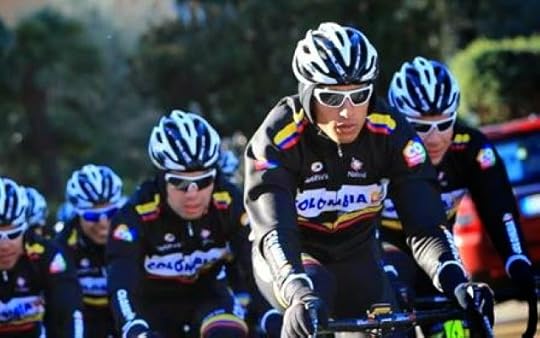
This is insanely smart marketing of a country that hasn't fared too well in the media.
Colombian athletes reciprocate the love. Santiago Giraldo, instead of signing his name on the camera after a winning match, often signs "I love you, Colombia." The entire country held their breath when the first Colombian women reached Everest's summit in 2007, and Ana Maria Giraldo unfurled the Colombian flag at the summit.

Colombian athletes often thank Colombia first. They have a deep-rooted feeling of nationalism and love for their country and how this country formed them. And it's something I really love about Colombia. Everybody feels part of something great when a Colombian accomplishes great things.It's a magical thing to feel an entire country vibrate with pride, stand behind a single athlete -- something that I've never seen anywhere else. Maybe it's because Colombians are tired of bad press. Maybe it's because of the non-stop jokes about cocaine and Pablo Escobar and the lure of the white lines ... really, it's not original and not funny to laugh about someone else's war. Every Colombian I know has suffered because of our drug habits in the US and Europe and around the world. Maybe it's simply the passion of the Latino.
Nevertheless, people who never watched cycling before are experts. (Admittedly, the tradition of awesome Colombian cyclists goes back a long way). Taxi drivers, waiters, lifeguards, doctors, engineers, hell ... even me ... can talk, with a certain degree of knowledge balanced by lots of bullshit about Falcao's injury and physical therapy, Santiago Giraldo's coach change, Nairo Quintana's favorite breakfast cereal, Mariana Pajon's (BMX world champion and gold medalist) lucky underwear. (Actually, I don't really know if she has lucky underwear, but I bet it wouldn't take long to find out.)

Colombians are involved and slightly obsessed about their international athletes. I didn't understand it when I first arrived. I thought, "It's just another game." Part of that comes from coming from such a big country. We have many, many athletes that stand out, win medals. The closest I've seen in the States to this kind of fervent pride is regional -- when Nevada rallied behind the San Francisco 49er quarterback Kapernick, a University of Nevada, Reno alumni and former football player.
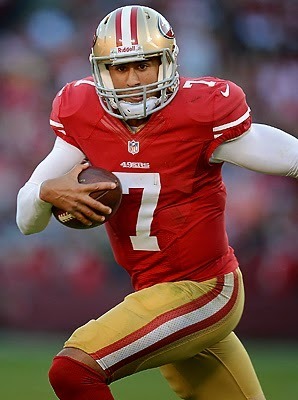
But that's just a speck of what an entire country experiences here. American football is a national sport -- pretty small potatoes from a world view. Kapernick is a guy that nobody will know outside of that sport's fanbase. What happens in Colombia is national pride for international sports achievements. It's insanely beautiful to see an entire country, entire country celebrate the athletes that wear their flag in the world arena of sports and, in turn, see those athletes celebrate their country.
And now, the World Cup is here. And Colombia is ready to face the Titans. And while the soccer team battles in Brazil, an entire country will pretty much shut down. I'm bracing myself for national anxiety, celebrations, tears and hijo de putas. The entire country shouts, oohs, curses, and cries together. You don't even have to be watching the game to know what's going on. Listen to the country. They'll tell you.
A bit obsessed. Yep. But it makes for a fantastic ride and emotional journey to follow, sweat, suffer, and celebrate.Plus, I get loads of cool vocabulary.

Last week, every Colombian I know had their TVs on to watch the last leg of the Giro d'Italia ... and I think pretty much all of us cried when the crowd started to sing the national anthem to celebrate Nairo Quintana and Rigoberto Uran's victories. (First and second place -- a historic day for Colombian sports).

The next day, Colombia's front pages were plastered with Falcao and how he's not going to the world cup. (Tears were shed again). When he initially got hurt earlier this year, this youtube video went viral, loosely translated "God, I know there's a lot of bad stuff going on in the world, but please cure Falcao so he can make lots of goals."
Today, in Amelia's school, all classrooms will be showing the opening ceremonies of the World Cup in Brazil.
And now everybody's waiting for Saturday morning. Work schedules are getting jiggled, changed around. Classes in institutes have been canceled. The entire country will be paralyzed for the 90 minutes of Colombia's first world cup confrontation in 16 years. Yeah. It's a BIG BIG DEAL since Colombia hasn't gone to a World Cup since the era of Pibe Valderrama and Faustino Asprilla (who later became known for his, um, sizable ...nevermind. I think they had to use an Amazonian Bamboo Palm leaf for that cover shot.)


In fact, June 15th are presidential elections and pretty much everybody says that voter turnout and how Colombians vote will depend on the results of the Colombia/Greece game on the 14th. (A little twisted, but it's the reality). There's a story that during a national crises (I don't remember which one) in the 1990s, some TV channels put on an old game between Colombia and Argentina, one in which Colombia won six to zero, to pacify the country. There's a great film called Golpe de Estado based on this game and a guerilla/military group in the mountains that make peace to watch the game together. An absurd reality.
The point is, Colombians live, breathe, and adore their athletes.
There's a tale (not fact checked) that when Lucho Herrera, one of Colombia's most famous cyclists pre-Nairo/Rigoberto who won the Vuelta Espana in 1987, was kidnapped by the guerilla, there was such an outcry that the guerilla released him right away. It's bad press to kidnap a national hero. (The magazine headline says: Lucho Herrera: Victory of a People) His victory in the Vuelta Espana was Colombia's victory. His kidnapping was Colombia's kidnapping.

When Hincapie rode with Lance Armstrong in all seven of Armstrong's Tour victories (yeah, yeah, I know) ... I remember listening to the telecast one day and the sports reporters going mad, "There goes our countryman. Here comes Colombia, ripping past the other riders. He's the champion of this leg! The winner! BRAVO COLOMBIA!"
I turned to Cesar. "Isn't he American?"
Cesar shrugged. "Not today."
And not today was true. George Hincapie, born of Colombian parents, was Colombian the years he rode with Lance Armstrong. (Though, admittedly, nobody shouts to loud about his Colombian heritage anymore.)
This past year, Colombia had the only national team riding in the Giro d'Italia. Somebody told me (and, no, I haven't fact checked any of this, either) that the team had made a pact that in every single mountain leg, one of their riders would do a breakaway. They'd rotate riders, practically kill themselves to make huge strides and distance between the Colombian rider and peloton, and, in turn, bring Colombia to the forefront of every television around the world -- the Colombia we, who live here, love. AND their job was to make any Colombian look good, even those not riding with the national team. In other words, an entire team of Colombians was in the Giro to support other Colombians regardless of who they rode with (eg Nairo and Rigoberto).

This is insanely smart marketing of a country that hasn't fared too well in the media.
Colombian athletes reciprocate the love. Santiago Giraldo, instead of signing his name on the camera after a winning match, often signs "I love you, Colombia." The entire country held their breath when the first Colombian women reached Everest's summit in 2007, and Ana Maria Giraldo unfurled the Colombian flag at the summit.

Colombian athletes often thank Colombia first. They have a deep-rooted feeling of nationalism and love for their country and how this country formed them. And it's something I really love about Colombia. Everybody feels part of something great when a Colombian accomplishes great things.It's a magical thing to feel an entire country vibrate with pride, stand behind a single athlete -- something that I've never seen anywhere else. Maybe it's because Colombians are tired of bad press. Maybe it's because of the non-stop jokes about cocaine and Pablo Escobar and the lure of the white lines ... really, it's not original and not funny to laugh about someone else's war. Every Colombian I know has suffered because of our drug habits in the US and Europe and around the world. Maybe it's simply the passion of the Latino.
Nevertheless, people who never watched cycling before are experts. (Admittedly, the tradition of awesome Colombian cyclists goes back a long way). Taxi drivers, waiters, lifeguards, doctors, engineers, hell ... even me ... can talk, with a certain degree of knowledge balanced by lots of bullshit about Falcao's injury and physical therapy, Santiago Giraldo's coach change, Nairo Quintana's favorite breakfast cereal, Mariana Pajon's (BMX world champion and gold medalist) lucky underwear. (Actually, I don't really know if she has lucky underwear, but I bet it wouldn't take long to find out.)

Colombians are involved and slightly obsessed about their international athletes. I didn't understand it when I first arrived. I thought, "It's just another game." Part of that comes from coming from such a big country. We have many, many athletes that stand out, win medals. The closest I've seen in the States to this kind of fervent pride is regional -- when Nevada rallied behind the San Francisco 49er quarterback Kapernick, a University of Nevada, Reno alumni and former football player.

But that's just a speck of what an entire country experiences here. American football is a national sport -- pretty small potatoes from a world view. Kapernick is a guy that nobody will know outside of that sport's fanbase. What happens in Colombia is national pride for international sports achievements. It's insanely beautiful to see an entire country, entire country celebrate the athletes that wear their flag in the world arena of sports and, in turn, see those athletes celebrate their country.
And now, the World Cup is here. And Colombia is ready to face the Titans. And while the soccer team battles in Brazil, an entire country will pretty much shut down. I'm bracing myself for national anxiety, celebrations, tears and hijo de putas. The entire country shouts, oohs, curses, and cries together. You don't even have to be watching the game to know what's going on. Listen to the country. They'll tell you.
A bit obsessed. Yep. But it makes for a fantastic ride and emotional journey to follow, sweat, suffer, and celebrate.Plus, I get loads of cool vocabulary.
Published on June 13, 2014 07:00
June 9, 2014
John Green is not YA ... or, better put, the definition of YA
Of late, I've read a flurry of op-ed pieces about reading habits, particularly adults who choose to read YA.
Grownups: Don't be Ashamed of your YA Habit
Against YA: Read What You Want: But you should feel embarrassed when what you're reading was written for children.
I could go on and on and on but I won't because they're all pretty much the same idea regurgitated, and at the center is John Green. Which, to me, is odd. And I'm sure it's probably strange to him and every other author on the planet because, well, he's not YA. It's absurd, really, all these confirmations about the greatness of YA lit because of him, as well as damning it all as self-indulgent, happy fluff because ... of him. There have been articles about the "John Green Effect." And there have been incredibly thoughtful pieces, this one by Anne Ursu in particular, about the dangers of pinning the success of YA on him.
It's almost as crazy as saying "adult" lit is good because of Nicholas Sparks. That's it. He's the one. He had Miley Cyrus (pre-tweaking and weird look) and The Climb and all that hullaballoo. It's all because of him literature has been saved. Pretty silly, isn't it? (Especially when we know we should thank Dan Brown for it all!)
So for readers who are new to YA, or, perhaps, didn't know they were reading YA, or thought they were reading YA and kind of freak out about it if it's not a book by John Green, assuming they've been duped by some evil librarian or book seller, "Bloody hell! I asked for YA and they gave me this non-John Green book! What the *#!@... Drivel! I won't read this drivel!" ... I've got a couple of things to say.
One: If you respond like that, you really, really need to chill out and watch something on Netflix ... or meditate. Yes. Yoga. Meditation.
Two: Relax, I'll walk you through it. I'll give you a little list about what YA is (or NOT):
Is John Green YA ... or is YA John green? Did you not read the snappy title?So is YA a genre? NOOOOOOOOOO! YA is NOT a genre. Nope. YA is a suggested age range. As is middle grade, first chapter books, first readers, picture books etc. So, please, if you say, "I read the YA genre," stop. It's not a genre. Just. Stop. Now.What is a genre? steampunk, historical fiction, science fiction, fantasy, dystopian (everybody get your bows and arrows!), contemporary, self help (see what I mean here ... you can have loads of age ranges for different genres ... limitless possibilities).Who invented YA? Mark Twain.Really? I'm shitting you. Think about it, though. It's always been around. The Adventures of Huck Finn, The Swiss Family Robinson, Kipling, Alice in Wonderland ... flash forward to The Outsiders, Catcher in the Rye, Lord of the Flies ... And when I was young I devoured Susan Cooper, Cynthia Voigt, Judy Blume, Ray Bradbury, Stephen King ... In the 1970s and 1980s, book sellers and librarians start to separate the "children's books" from the "adolescent books" and "adult books" ... because they're tapped into what kids are reading (not Marcel Proust ... usually) and it's an easy way to target your readers and help them save time. (This is all pre-crazy, Amazon monopoly that does it for you by tapping into all your purchases and pumping out suggestions a la Feed).What about, like, the 1500s? What did teens read then? Um. That's the dark ages and nobody read because everybody was busy building stuff for megalomaniacal kings or farming things or being hanged and decapitated and stuff. Is YA easy reading with easy endings to make teens feel good and vindicated and stuff? Depends on the author and/or book. Some are Nicholas Sparks-y. Many, MANY, aren't. Want a challenge? Try: MT Anderson, Ellen Hopkins, Gene Luen Yang, Walter Dean Myers, Anne Ursu, Kate Milford, Laurie Halse Anderson, E Lockhart, AS King, Sherman Alexie, Antony John, Libba Bray, Melina Marchetta, Markus Zusak, Patrick Ness, Sara Zarr ... just off the top of my head.
So what's the deal with John Green? He's a good writer, brilliant at reaching readers, has established himself as a social networking guru, has built an insanely loyal following, and seems like a genuinely nice guy. And, yes, he writes good books. So why are all these people writing about him? I'd gander that all these writers busy writing about YA aren't reading YA ... They might've picked up a couple of John Green novels, but they've never really spent the time in the stacks reading the magic of other authors that preceded him, and authors that share shelf space with him today.So ... writing a book is no easy feat. Writing a good book is pretty freaking hard to do. Writing several good books ... well, that's extraordinary, really. Readers are the greatest gift of any writer (and preferably not ones that feel obligated to read the book because, um, she's your mom). But there's nothing more magical to have someone read your words and say, "Wow. Thank you for saying what I feel."
And I'd venture to say anybody who reads should be celebrated, whether they read magazines, newspapers, novels, poetry, plays, cereal boxes, vampire novels, erotica, scientific journals ... whatever. NOT reading is the embarrassing thing, isn't it? I think the best pickup line EVER is "Hey. What are you reading?"
(Reading pyramid may vary depending on reader ... and that's TOTALLY OKAY!)
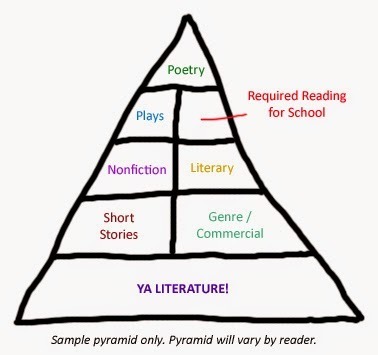
There are lots of those writers out there and a bountiful of readers who devour books by all authors ... And though not all of those writers receive thousands of letters of admiration a day a la John Green, their effect is just as profound in a few. I think this "effect" of literature should be called: "The Great Book Effect." Or "Holy shit, that's an awesome read Effect." Or "Stayed Up All Night to Read Effect." (But nobody's asked me!)
Grownups: Don't be Ashamed of your YA Habit
Against YA: Read What You Want: But you should feel embarrassed when what you're reading was written for children.
I could go on and on and on but I won't because they're all pretty much the same idea regurgitated, and at the center is John Green. Which, to me, is odd. And I'm sure it's probably strange to him and every other author on the planet because, well, he's not YA. It's absurd, really, all these confirmations about the greatness of YA lit because of him, as well as damning it all as self-indulgent, happy fluff because ... of him. There have been articles about the "John Green Effect." And there have been incredibly thoughtful pieces, this one by Anne Ursu in particular, about the dangers of pinning the success of YA on him.
It's almost as crazy as saying "adult" lit is good because of Nicholas Sparks. That's it. He's the one. He had Miley Cyrus (pre-tweaking and weird look) and The Climb and all that hullaballoo. It's all because of him literature has been saved. Pretty silly, isn't it? (Especially when we know we should thank Dan Brown for it all!)
So for readers who are new to YA, or, perhaps, didn't know they were reading YA, or thought they were reading YA and kind of freak out about it if it's not a book by John Green, assuming they've been duped by some evil librarian or book seller, "Bloody hell! I asked for YA and they gave me this non-John Green book! What the *#!@... Drivel! I won't read this drivel!" ... I've got a couple of things to say.
One: If you respond like that, you really, really need to chill out and watch something on Netflix ... or meditate. Yes. Yoga. Meditation.
Two: Relax, I'll walk you through it. I'll give you a little list about what YA is (or NOT):
Is John Green YA ... or is YA John green? Did you not read the snappy title?So is YA a genre? NOOOOOOOOOO! YA is NOT a genre. Nope. YA is a suggested age range. As is middle grade, first chapter books, first readers, picture books etc. So, please, if you say, "I read the YA genre," stop. It's not a genre. Just. Stop. Now.What is a genre? steampunk, historical fiction, science fiction, fantasy, dystopian (everybody get your bows and arrows!), contemporary, self help (see what I mean here ... you can have loads of age ranges for different genres ... limitless possibilities).Who invented YA? Mark Twain.Really? I'm shitting you. Think about it, though. It's always been around. The Adventures of Huck Finn, The Swiss Family Robinson, Kipling, Alice in Wonderland ... flash forward to The Outsiders, Catcher in the Rye, Lord of the Flies ... And when I was young I devoured Susan Cooper, Cynthia Voigt, Judy Blume, Ray Bradbury, Stephen King ... In the 1970s and 1980s, book sellers and librarians start to separate the "children's books" from the "adolescent books" and "adult books" ... because they're tapped into what kids are reading (not Marcel Proust ... usually) and it's an easy way to target your readers and help them save time. (This is all pre-crazy, Amazon monopoly that does it for you by tapping into all your purchases and pumping out suggestions a la Feed).What about, like, the 1500s? What did teens read then? Um. That's the dark ages and nobody read because everybody was busy building stuff for megalomaniacal kings or farming things or being hanged and decapitated and stuff. Is YA easy reading with easy endings to make teens feel good and vindicated and stuff? Depends on the author and/or book. Some are Nicholas Sparks-y. Many, MANY, aren't. Want a challenge? Try: MT Anderson, Ellen Hopkins, Gene Luen Yang, Walter Dean Myers, Anne Ursu, Kate Milford, Laurie Halse Anderson, E Lockhart, AS King, Sherman Alexie, Antony John, Libba Bray, Melina Marchetta, Markus Zusak, Patrick Ness, Sara Zarr ... just off the top of my head.

So what's the deal with John Green? He's a good writer, brilliant at reaching readers, has established himself as a social networking guru, has built an insanely loyal following, and seems like a genuinely nice guy. And, yes, he writes good books. So why are all these people writing about him? I'd gander that all these writers busy writing about YA aren't reading YA ... They might've picked up a couple of John Green novels, but they've never really spent the time in the stacks reading the magic of other authors that preceded him, and authors that share shelf space with him today.So ... writing a book is no easy feat. Writing a good book is pretty freaking hard to do. Writing several good books ... well, that's extraordinary, really. Readers are the greatest gift of any writer (and preferably not ones that feel obligated to read the book because, um, she's your mom). But there's nothing more magical to have someone read your words and say, "Wow. Thank you for saying what I feel."
And I'd venture to say anybody who reads should be celebrated, whether they read magazines, newspapers, novels, poetry, plays, cereal boxes, vampire novels, erotica, scientific journals ... whatever. NOT reading is the embarrassing thing, isn't it? I think the best pickup line EVER is "Hey. What are you reading?"
(Reading pyramid may vary depending on reader ... and that's TOTALLY OKAY!)

There are lots of those writers out there and a bountiful of readers who devour books by all authors ... And though not all of those writers receive thousands of letters of admiration a day a la John Green, their effect is just as profound in a few. I think this "effect" of literature should be called: "The Great Book Effect." Or "Holy shit, that's an awesome read Effect." Or "Stayed Up All Night to Read Effect." (But nobody's asked me!)
Published on June 09, 2014 07:00
May 7, 2014
Things You Might Not Know About Being a Writer ... The Business Side of it All
I think when we're in the middle of something, we feel like everybody understands what we do because, well, we're the ones doing it, every day. Most of things these about being writer I never knew until I was in the midst of it all. Some were shocking. Some came naturally. And some have just been part of my work ethic from the beginning -- but things I didn't really know how to put a name to.
I want to present these things in a neutral way, without putting a negative or positive vibe to them.
Here are some peculiarities, hazards, and unexpected wonderful things about the business of writing.
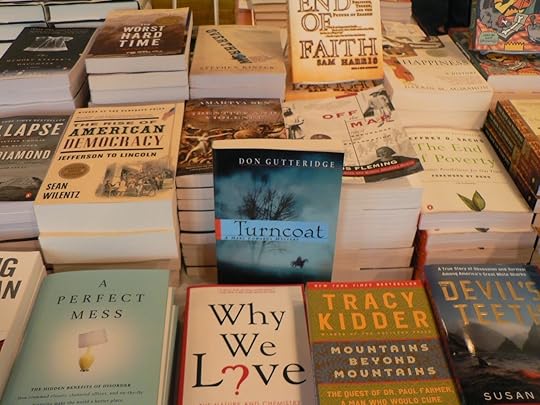 Co-Op TableI have no job security. (Hence, DON'T QUIT THE DAY JOB ... unless you're John Grisham, JK Rowling, Ellen Hopkins or one of those very select few ... like 3% of authors quit their day jobs.)I don't pick my title. I get to have input, for sure, but I'm not the final on the title choice. Freeze Frame went through seven titles from Finding Yesterday to Shattered. I love the final choice. My other books have had a similar process. Why? Because there are lots of others who have lots of experience who are more in tuned to the market than I am. It's not like naming your kid, okay? This is business.I don't pick my covers. I don't design my covers. I don't have a voice in the process. I've been shown my covers ahead of time out of courtesy, of course, and my editors and publishers have always wanted me to be on board with them. I've been fortunate in that I've had some pretty amazing covers so far. (My personal favorites are Freeze Frame and Compulsion because I truly believe those covers are the ones that best encapsulated the books. My other covers are beautiful, but I don't think they say as much about the book as FF and Compulsion's covers do). But I also know that my approval is not needed.
Co-Op TableI have no job security. (Hence, DON'T QUIT THE DAY JOB ... unless you're John Grisham, JK Rowling, Ellen Hopkins or one of those very select few ... like 3% of authors quit their day jobs.)I don't pick my title. I get to have input, for sure, but I'm not the final on the title choice. Freeze Frame went through seven titles from Finding Yesterday to Shattered. I love the final choice. My other books have had a similar process. Why? Because there are lots of others who have lots of experience who are more in tuned to the market than I am. It's not like naming your kid, okay? This is business.I don't pick my covers. I don't design my covers. I don't have a voice in the process. I've been shown my covers ahead of time out of courtesy, of course, and my editors and publishers have always wanted me to be on board with them. I've been fortunate in that I've had some pretty amazing covers so far. (My personal favorites are Freeze Frame and Compulsion because I truly believe those covers are the ones that best encapsulated the books. My other covers are beautiful, but I don't think they say as much about the book as FF and Compulsion's covers do). But I also know that my approval is not needed.
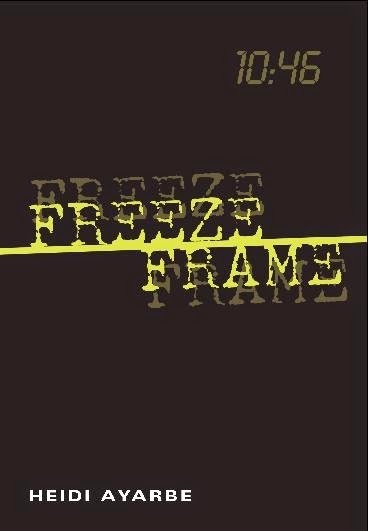
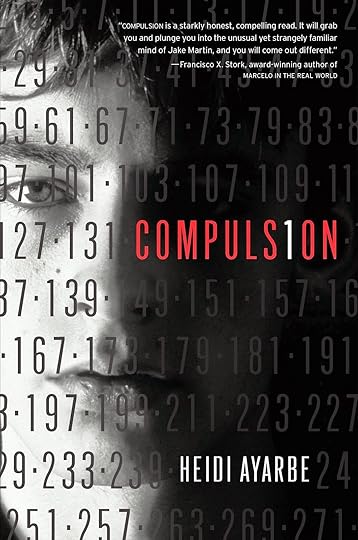
Publishers and editors truly believe in their authors, their books, and go to bat, every day, for unknown authors, authors who have soft sales (industry lingo for "The book tanked."), and risky projects. They have a lot of faith in their writers. When your book doesn't go to "paperback" it's because of "soft sales." (Yes, play taps here ... until your next book or next project or until the next editor takes another leap of faith.) Two of my books haven't gone paperback. (Which is total suckage. Yes. But it is what it is). Speaking of leaps of faith, this whole business has that lovely element -- people who believe in others' work without knowing for certain whether it will bring in cash. And some publishers and editors choose books simply because they believe they're worth it, need to be out there, regardless of possible tanking (see above).It's not done until ... they say so. There are dizzying numbers of revisions with your editor, then copy editors, then back to the editor ... then the ping-pong match between everyone until ... ta-da! My editors/copy editors fact check everything (from movie quotes to routes I had characters take in the city to make sure it was feasible). And one wasn't aware of the not-so-secret menu from In-N-Out Burgers until we assured her that it exists and I didn't pull the Neapolitan shake out of ... nowhere.I only get fifteen copies of my books. That's it. It's not like I have a never-ending supply of books to give away. And those copies are reserved for, more often than not, prizes, promotion, huge thanks to anyone who's helped in the process, my sister, nieces, daughters and mom. They're GOLDEN and so when someone asks me for a copy, and I end up sending one, it's because I really love that person or believe in his/her charity, and it's more likely than not, one of the books I bought with my money to have for extra causes.If you don't sell or win awards, you won't have a long, loving relationship with any publisher. It's until, "'till poor sales do us part." It's a business, after all, not a charitable organization investing tens of thousands of dollars to fail.Most books don't make back their advances ... It's a pyramid of a few select authors pulling the weight of the others. There's a huge "mid-list" group of authors that might go into second printing, win an award, get on State lists ... all of this advances the publishing house clout and gives them a boost. Here's a really good post on what each book costs the publisher and how much they make or lose.I could spend a year on a book, another on revisions, after receiving and advance and getting it ready for publication, approved by everyone, and have it still get shelved. Timing. Bad timing, usually. Some books, after all the work in the world, don't get published.After getting the book out there, some stores may choose not to carry it. This is pretty devastating if it's a big chain (Barnes & Noble). There are 696 Barnes & Noble stores. If their buyers don't want my books in the stores, selling the book is really really hard to do. The bookstores might get excited about the book, order a thousand, and return, every single one. All books are kind of on consignment.
 I owe so much of what I've been able to write today to my agent, my editors, publishers, and the IRA (International Reading Association) who awarded Freeze Frame, in 2009, with the best book for young adults. I am forever grateful because I've had the privilege to write the stories that I've wanted with support and professionals driving me to be better with every page, every word. This is something I don't take for granted. Ever.Publishers nominate books to get key real estate in bookstores (display cases and tables) and bookstores/chains choose which books they want to display -- sometimes more books are nominated (between all publishers) than there is space. It's all about which book they think (both publisher and book seller) will sell most and bring in more buyers. This is called co-op. There's a lot of behind the scenes stuff, so I recommend you read the linked post by Nathan Bransford. Most touring authors travel between 20 and 25 weeks/year. Some authors go on tour with the release of a book. These guys are the big dudes in the business. Many make a living visiting schools and book fairs working hard to get booked and delivering stellar work. And most are like me. At home. Writing. Blog touring because doing actual tours would be virtually impossible because of financial reasons or time.The most important time for any book is pre-sales and the month after it's released. After that ... it sort of creeps onto the shelf of the forgotten. (Which I like to refer to the shelf of soon-to-be-discovered ...) *sigh* Word of mouth continues to be the most powerful motor for sales. If you love a book, SCREAM ABOUT IT.
I owe so much of what I've been able to write today to my agent, my editors, publishers, and the IRA (International Reading Association) who awarded Freeze Frame, in 2009, with the best book for young adults. I am forever grateful because I've had the privilege to write the stories that I've wanted with support and professionals driving me to be better with every page, every word. This is something I don't take for granted. Ever.Publishers nominate books to get key real estate in bookstores (display cases and tables) and bookstores/chains choose which books they want to display -- sometimes more books are nominated (between all publishers) than there is space. It's all about which book they think (both publisher and book seller) will sell most and bring in more buyers. This is called co-op. There's a lot of behind the scenes stuff, so I recommend you read the linked post by Nathan Bransford. Most touring authors travel between 20 and 25 weeks/year. Some authors go on tour with the release of a book. These guys are the big dudes in the business. Many make a living visiting schools and book fairs working hard to get booked and delivering stellar work. And most are like me. At home. Writing. Blog touring because doing actual tours would be virtually impossible because of financial reasons or time.The most important time for any book is pre-sales and the month after it's released. After that ... it sort of creeps onto the shelf of the forgotten. (Which I like to refer to the shelf of soon-to-be-discovered ...) *sigh* Word of mouth continues to be the most powerful motor for sales. If you love a book, SCREAM ABOUT IT.
It's a quirky business. That's the point. It's a business. Do you have any questions about the book making business? A lot of it is still a bit foggy to me. Honestly, I learn more every day.
I want to present these things in a neutral way, without putting a negative or positive vibe to them.
Here are some peculiarities, hazards, and unexpected wonderful things about the business of writing.
 Co-Op TableI have no job security. (Hence, DON'T QUIT THE DAY JOB ... unless you're John Grisham, JK Rowling, Ellen Hopkins or one of those very select few ... like 3% of authors quit their day jobs.)I don't pick my title. I get to have input, for sure, but I'm not the final on the title choice. Freeze Frame went through seven titles from Finding Yesterday to Shattered. I love the final choice. My other books have had a similar process. Why? Because there are lots of others who have lots of experience who are more in tuned to the market than I am. It's not like naming your kid, okay? This is business.I don't pick my covers. I don't design my covers. I don't have a voice in the process. I've been shown my covers ahead of time out of courtesy, of course, and my editors and publishers have always wanted me to be on board with them. I've been fortunate in that I've had some pretty amazing covers so far. (My personal favorites are Freeze Frame and Compulsion because I truly believe those covers are the ones that best encapsulated the books. My other covers are beautiful, but I don't think they say as much about the book as FF and Compulsion's covers do). But I also know that my approval is not needed.
Co-Op TableI have no job security. (Hence, DON'T QUIT THE DAY JOB ... unless you're John Grisham, JK Rowling, Ellen Hopkins or one of those very select few ... like 3% of authors quit their day jobs.)I don't pick my title. I get to have input, for sure, but I'm not the final on the title choice. Freeze Frame went through seven titles from Finding Yesterday to Shattered. I love the final choice. My other books have had a similar process. Why? Because there are lots of others who have lots of experience who are more in tuned to the market than I am. It's not like naming your kid, okay? This is business.I don't pick my covers. I don't design my covers. I don't have a voice in the process. I've been shown my covers ahead of time out of courtesy, of course, and my editors and publishers have always wanted me to be on board with them. I've been fortunate in that I've had some pretty amazing covers so far. (My personal favorites are Freeze Frame and Compulsion because I truly believe those covers are the ones that best encapsulated the books. My other covers are beautiful, but I don't think they say as much about the book as FF and Compulsion's covers do). But I also know that my approval is not needed. 

Publishers and editors truly believe in their authors, their books, and go to bat, every day, for unknown authors, authors who have soft sales (industry lingo for "The book tanked."), and risky projects. They have a lot of faith in their writers. When your book doesn't go to "paperback" it's because of "soft sales." (Yes, play taps here ... until your next book or next project or until the next editor takes another leap of faith.) Two of my books haven't gone paperback. (Which is total suckage. Yes. But it is what it is). Speaking of leaps of faith, this whole business has that lovely element -- people who believe in others' work without knowing for certain whether it will bring in cash. And some publishers and editors choose books simply because they believe they're worth it, need to be out there, regardless of possible tanking (see above).It's not done until ... they say so. There are dizzying numbers of revisions with your editor, then copy editors, then back to the editor ... then the ping-pong match between everyone until ... ta-da! My editors/copy editors fact check everything (from movie quotes to routes I had characters take in the city to make sure it was feasible). And one wasn't aware of the not-so-secret menu from In-N-Out Burgers until we assured her that it exists and I didn't pull the Neapolitan shake out of ... nowhere.I only get fifteen copies of my books. That's it. It's not like I have a never-ending supply of books to give away. And those copies are reserved for, more often than not, prizes, promotion, huge thanks to anyone who's helped in the process, my sister, nieces, daughters and mom. They're GOLDEN and so when someone asks me for a copy, and I end up sending one, it's because I really love that person or believe in his/her charity, and it's more likely than not, one of the books I bought with my money to have for extra causes.If you don't sell or win awards, you won't have a long, loving relationship with any publisher. It's until, "'till poor sales do us part." It's a business, after all, not a charitable organization investing tens of thousands of dollars to fail.Most books don't make back their advances ... It's a pyramid of a few select authors pulling the weight of the others. There's a huge "mid-list" group of authors that might go into second printing, win an award, get on State lists ... all of this advances the publishing house clout and gives them a boost. Here's a really good post on what each book costs the publisher and how much they make or lose.I could spend a year on a book, another on revisions, after receiving and advance and getting it ready for publication, approved by everyone, and have it still get shelved. Timing. Bad timing, usually. Some books, after all the work in the world, don't get published.After getting the book out there, some stores may choose not to carry it. This is pretty devastating if it's a big chain (Barnes & Noble). There are 696 Barnes & Noble stores. If their buyers don't want my books in the stores, selling the book is really really hard to do. The bookstores might get excited about the book, order a thousand, and return, every single one. All books are kind of on consignment.
 I owe so much of what I've been able to write today to my agent, my editors, publishers, and the IRA (International Reading Association) who awarded Freeze Frame, in 2009, with the best book for young adults. I am forever grateful because I've had the privilege to write the stories that I've wanted with support and professionals driving me to be better with every page, every word. This is something I don't take for granted. Ever.Publishers nominate books to get key real estate in bookstores (display cases and tables) and bookstores/chains choose which books they want to display -- sometimes more books are nominated (between all publishers) than there is space. It's all about which book they think (both publisher and book seller) will sell most and bring in more buyers. This is called co-op. There's a lot of behind the scenes stuff, so I recommend you read the linked post by Nathan Bransford. Most touring authors travel between 20 and 25 weeks/year. Some authors go on tour with the release of a book. These guys are the big dudes in the business. Many make a living visiting schools and book fairs working hard to get booked and delivering stellar work. And most are like me. At home. Writing. Blog touring because doing actual tours would be virtually impossible because of financial reasons or time.The most important time for any book is pre-sales and the month after it's released. After that ... it sort of creeps onto the shelf of the forgotten. (Which I like to refer to the shelf of soon-to-be-discovered ...) *sigh* Word of mouth continues to be the most powerful motor for sales. If you love a book, SCREAM ABOUT IT.
I owe so much of what I've been able to write today to my agent, my editors, publishers, and the IRA (International Reading Association) who awarded Freeze Frame, in 2009, with the best book for young adults. I am forever grateful because I've had the privilege to write the stories that I've wanted with support and professionals driving me to be better with every page, every word. This is something I don't take for granted. Ever.Publishers nominate books to get key real estate in bookstores (display cases and tables) and bookstores/chains choose which books they want to display -- sometimes more books are nominated (between all publishers) than there is space. It's all about which book they think (both publisher and book seller) will sell most and bring in more buyers. This is called co-op. There's a lot of behind the scenes stuff, so I recommend you read the linked post by Nathan Bransford. Most touring authors travel between 20 and 25 weeks/year. Some authors go on tour with the release of a book. These guys are the big dudes in the business. Many make a living visiting schools and book fairs working hard to get booked and delivering stellar work. And most are like me. At home. Writing. Blog touring because doing actual tours would be virtually impossible because of financial reasons or time.The most important time for any book is pre-sales and the month after it's released. After that ... it sort of creeps onto the shelf of the forgotten. (Which I like to refer to the shelf of soon-to-be-discovered ...) *sigh* Word of mouth continues to be the most powerful motor for sales. If you love a book, SCREAM ABOUT IT.It's a quirky business. That's the point. It's a business. Do you have any questions about the book making business? A lot of it is still a bit foggy to me. Honestly, I learn more every day.
Published on May 07, 2014 08:32
April 26, 2014
Heidi Ayarbe's Common Core Curriculum
Uff.
A lot is happening about the latest educational catch phrase "the common core." I'm not patient enough to read through the literature or educated enough about the topic to comment other than what I see is a lot of frustration and confusion and teachers getting more paperwork.
And there's a lot of weird math stuff??
I could be wrong. It could be the greatest salvation to our education system yet, right there behind No Child Left Behind (that was a winner), charter schools that cater to every whim (from theater to music to watermelon spitting), outdoor education a la Thoreau and more.
Common core sounds good, though. I like the ring of it. It sounds like the basics -- the basics to get by in life. So since I can't be bothered to actually read through the common core standards, I've made up my own, ones that every human being should learn. (Maybe it can get through legislation if I throw in loads of paperwork, hours of scan tron testing and such). I just feel like common core is common sense that kind of isn't so common anymore. And since I have an inflated ego, I'm going to name this new educational trend after me. (This should catch fire, I tell ya!)
THE AYARBE COMMON CORE
1. Breathe. Breathe in and breathe out. Fill your body with air. It's alarming how many people forget to do this and do it well. (If you cough while breathing... see #10).

2. Stand up tall. Hold your head high. Keep your back straight. Yep. Stop slouching. Don't hide behind your bangs, either.
3. Sit down to eat with nothing but your food, friends, and family at the table. (Okay, and utensils. We're not the Croods). No I-phones, cell phones, newspapers or TV. Just you and your food and friends and family. Chew. Taste. Enjoy. Swallow. Tell a story or two. Laugh. Repeat until full. When you're full, stop eating. Just sit and enjoy the company of your friends and family and be grateful you have a full stomach. (Then, for good measure, take your dirty plate to the kitchen sink and help wash up afterwards.)
4. Exercise. Run, jump, dance, jog, play hopscotch, plant a garden, walk, swim, climb a tree, fly a kite ... whatever. Move. Your body is a gift and movement is essential to its core.
5. Sing really loud, even if it's off-key. The world needs more music.
6. Look people in the eye and say, "Hello. Good bye. Please. Thank you." (Whichever might be appropriate for the occasion). Always make sure they hear you and know that you SEE them. Everybody deserves to be looked in the eye. Everybody needs to feel that his or her space in the world is real. When you look at somebody, you are saying, "You matter."
7. Listen. Really listen. Pay attention to the meaning behind the words. Ask questions. Listen more.
8. Make up silly stories. You don't have to worry about character development or plot arcs ... just tell stories and laugh and be nonsensical and create magic out of words. The structure will come soon enough. For now, though, just weave the threads of your imagination into whatever shape you'd like.
9. Be kind. Be kind to yourself. Be kind to others. If you don't know how, learn how. It's not just something you do to look good, it's an extension of who you are on the inside.

10. Take care of your world (see #1). If you see something beautiful, leave it as you saw it. If you see a place that needs to be beautified, change it. You are the instrument for change in the world. You make a difference.
11. Work hard. Be useful.
12. Respect yourself. Respect your world. Respect others. And demand that others do the same.
I kind of think if all our kids graduate and have this common core, we'll pretty much be at the top of our game. Sure, you can throw in some periodic tables, quadratic equations, narrative essays in the mix. But make sure this is the core.
A lot is happening about the latest educational catch phrase "the common core." I'm not patient enough to read through the literature or educated enough about the topic to comment other than what I see is a lot of frustration and confusion and teachers getting more paperwork.
And there's a lot of weird math stuff??
I could be wrong. It could be the greatest salvation to our education system yet, right there behind No Child Left Behind (that was a winner), charter schools that cater to every whim (from theater to music to watermelon spitting), outdoor education a la Thoreau and more.
Common core sounds good, though. I like the ring of it. It sounds like the basics -- the basics to get by in life. So since I can't be bothered to actually read through the common core standards, I've made up my own, ones that every human being should learn. (Maybe it can get through legislation if I throw in loads of paperwork, hours of scan tron testing and such). I just feel like common core is common sense that kind of isn't so common anymore. And since I have an inflated ego, I'm going to name this new educational trend after me. (This should catch fire, I tell ya!)
THE AYARBE COMMON CORE
1. Breathe. Breathe in and breathe out. Fill your body with air. It's alarming how many people forget to do this and do it well. (If you cough while breathing... see #10).

2. Stand up tall. Hold your head high. Keep your back straight. Yep. Stop slouching. Don't hide behind your bangs, either.
3. Sit down to eat with nothing but your food, friends, and family at the table. (Okay, and utensils. We're not the Croods). No I-phones, cell phones, newspapers or TV. Just you and your food and friends and family. Chew. Taste. Enjoy. Swallow. Tell a story or two. Laugh. Repeat until full. When you're full, stop eating. Just sit and enjoy the company of your friends and family and be grateful you have a full stomach. (Then, for good measure, take your dirty plate to the kitchen sink and help wash up afterwards.)
4. Exercise. Run, jump, dance, jog, play hopscotch, plant a garden, walk, swim, climb a tree, fly a kite ... whatever. Move. Your body is a gift and movement is essential to its core.
5. Sing really loud, even if it's off-key. The world needs more music.
6. Look people in the eye and say, "Hello. Good bye. Please. Thank you." (Whichever might be appropriate for the occasion). Always make sure they hear you and know that you SEE them. Everybody deserves to be looked in the eye. Everybody needs to feel that his or her space in the world is real. When you look at somebody, you are saying, "You matter."
7. Listen. Really listen. Pay attention to the meaning behind the words. Ask questions. Listen more.
8. Make up silly stories. You don't have to worry about character development or plot arcs ... just tell stories and laugh and be nonsensical and create magic out of words. The structure will come soon enough. For now, though, just weave the threads of your imagination into whatever shape you'd like.
9. Be kind. Be kind to yourself. Be kind to others. If you don't know how, learn how. It's not just something you do to look good, it's an extension of who you are on the inside.

10. Take care of your world (see #1). If you see something beautiful, leave it as you saw it. If you see a place that needs to be beautified, change it. You are the instrument for change in the world. You make a difference.
11. Work hard. Be useful.
12. Respect yourself. Respect your world. Respect others. And demand that others do the same.
I kind of think if all our kids graduate and have this common core, we'll pretty much be at the top of our game. Sure, you can throw in some periodic tables, quadratic equations, narrative essays in the mix. But make sure this is the core.
Published on April 26, 2014 08:01
April 1, 2014
All You Need to Know About Creating Kick-Ass Characters ...
... You can learn from KICK BUTTOWSKI -- Suburban Daredevil
Did you get that play on words there? Kick-ass character? Kick Buttowski. You see?
Okay ... Let's get back to the character stuff.
Here's the deal. I have a two-year-old and six-year-old and got to the point that if I were to see another saccharine character that was the perfect friend and always nice with an always nice family that always had an educational or moral message to shove down my throat, I was going to choke on the too-expensive Cheerios I justify buying for "my girls" even though they don't eat them (I know. I buy them for me using my daughters as an excuse. Something you won't see in freaking Princess Sofia) and give up on animation all together. It's like they've all become these interchangeable characters with nothing remarkable about any of them. This weird homogeneity of kindness and goodness and ... GAH!

"Where are the falling anvils?"
"Where are the ACME explosions?"
"Why is everybody so freaking nice?"
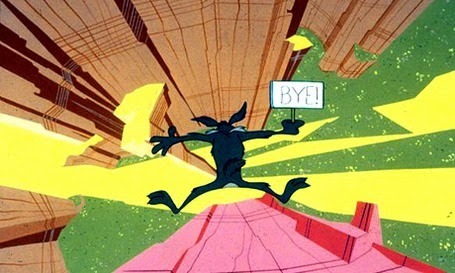
Then ... I stumbled upon THE ultimate of ultimates, the best of the best, the amazing of the amazings, the biggest pain in the ass of the pains in the asses: Clarence "Kick" Buttowski.
Pay attention, guys, this kid BURIES Doc McStuffins and Princess Sofia and Rolie Polie Olie and the damned animals on wheels in the jungle. I won't go on. (And, please, do not make this a reflection about me watching too much TV with my kids, okay? Yeah. Yeah. Brain damage aside. Focus here, people.)
Rules of characters. (Yep. All great characters need to follow some basic rules to make them great characters.)
1. A character needs to want something:
Kick wants to be the world's greatest daredevil, Evil Knievel-style.2. Something is in the way of the character and his goal:
His height (he's short). He has to shop in the "short and squat" section of the store. LOVE this.He lives in Suburbia, America. He's not popular. His family -- he has a bully big brother, princess little sister, pansy dad, and mom (a retired speed boat racer ... which is a cool surprise in and of itself. 3. We don't have to like a character, but we should admire one:
Kick never gives up. He's determined and will do what it takes to get what he wants. You can trust Kick. He won't tell anybody's deepest secrets (like how Dead Man DAve is still alive).Kick is a good friend. His best friend is the afeminate son of the Viking family that owns Battlesnax -- this insanely macho Viking food place. His name is Gunther Magnusun, and he always wears Crocs and will do ANYTHING for Kick. As Kick will do anything for him.Kick is a good brother. When it comes down to it, he'll help his sister out at her beauty pageants and his brother (who is a total loser) at his lame parties. And when it comes to a crunch, they're allies. They usually don't get along. They fight like mad, but they're siblings that know that they've got each others' backs.Kick is a good son. His dad totally embarrasses him.His mom is pretty absent. Both parents spend their time taking Brianna, the little sister, to pageants. But at the end of the day, he doesn't want to hurt them or their feelings. Though he finds them completely irrelevant at times.4. A good character has to have flaws and quirks -- or something VERY unique to help develop them and distinguish them from every other character on the planet.
Even though he's only 10, he sounds like he's been a pack-a-day smoker for the past fifty years.He wears the SAME Evil Knievel outfit every single day. I've seen him change the outfit once or twice but wear the helmet, always.As do the other characters wear their same clothes every day. Magnus' Crocs kill me! He's completely reckless and resourceful and irreverent. He blows it. He says the wrong thing, does the wrong thing, and is completely human about it. FAR from perfect. Basically, Kick is it. I laugh, out loud, every morning braiding my daughter's hair for school because he is one of the best animated characters out there. (I wish I'd invented him!) And he's surrounded by such an amazing cast of equally interesting, complex characters. It's such a pleasure to watch a "real kid" who makes real trouble who is misunderstood and not always valued but has such a strong sense of who he is, he's willing to take risks (the heart kind) to do the right thing for the people he loves.
Easy right?
Um. Nope. So, back to work, write? (Get it. How I changed "right" for "write." Yeah. Okay. I need to get back to work, too.

Did you get that play on words there? Kick-ass character? Kick Buttowski. You see?
Okay ... Let's get back to the character stuff.
Here's the deal. I have a two-year-old and six-year-old and got to the point that if I were to see another saccharine character that was the perfect friend and always nice with an always nice family that always had an educational or moral message to shove down my throat, I was going to choke on the too-expensive Cheerios I justify buying for "my girls" even though they don't eat them (I know. I buy them for me using my daughters as an excuse. Something you won't see in freaking Princess Sofia) and give up on animation all together. It's like they've all become these interchangeable characters with nothing remarkable about any of them. This weird homogeneity of kindness and goodness and ... GAH!

"Where are the falling anvils?"
"Where are the ACME explosions?"
"Why is everybody so freaking nice?"

Then ... I stumbled upon THE ultimate of ultimates, the best of the best, the amazing of the amazings, the biggest pain in the ass of the pains in the asses: Clarence "Kick" Buttowski.
Pay attention, guys, this kid BURIES Doc McStuffins and Princess Sofia and Rolie Polie Olie and the damned animals on wheels in the jungle. I won't go on. (And, please, do not make this a reflection about me watching too much TV with my kids, okay? Yeah. Yeah. Brain damage aside. Focus here, people.)
Rules of characters. (Yep. All great characters need to follow some basic rules to make them great characters.)
1. A character needs to want something:
Kick wants to be the world's greatest daredevil, Evil Knievel-style.2. Something is in the way of the character and his goal:
His height (he's short). He has to shop in the "short and squat" section of the store. LOVE this.He lives in Suburbia, America. He's not popular. His family -- he has a bully big brother, princess little sister, pansy dad, and mom (a retired speed boat racer ... which is a cool surprise in and of itself. 3. We don't have to like a character, but we should admire one:
Kick never gives up. He's determined and will do what it takes to get what he wants. You can trust Kick. He won't tell anybody's deepest secrets (like how Dead Man DAve is still alive).Kick is a good friend. His best friend is the afeminate son of the Viking family that owns Battlesnax -- this insanely macho Viking food place. His name is Gunther Magnusun, and he always wears Crocs and will do ANYTHING for Kick. As Kick will do anything for him.Kick is a good brother. When it comes down to it, he'll help his sister out at her beauty pageants and his brother (who is a total loser) at his lame parties. And when it comes to a crunch, they're allies. They usually don't get along. They fight like mad, but they're siblings that know that they've got each others' backs.Kick is a good son. His dad totally embarrasses him.His mom is pretty absent. Both parents spend their time taking Brianna, the little sister, to pageants. But at the end of the day, he doesn't want to hurt them or their feelings. Though he finds them completely irrelevant at times.4. A good character has to have flaws and quirks -- or something VERY unique to help develop them and distinguish them from every other character on the planet.
Even though he's only 10, he sounds like he's been a pack-a-day smoker for the past fifty years.He wears the SAME Evil Knievel outfit every single day. I've seen him change the outfit once or twice but wear the helmet, always.As do the other characters wear their same clothes every day. Magnus' Crocs kill me! He's completely reckless and resourceful and irreverent. He blows it. He says the wrong thing, does the wrong thing, and is completely human about it. FAR from perfect. Basically, Kick is it. I laugh, out loud, every morning braiding my daughter's hair for school because he is one of the best animated characters out there. (I wish I'd invented him!) And he's surrounded by such an amazing cast of equally interesting, complex characters. It's such a pleasure to watch a "real kid" who makes real trouble who is misunderstood and not always valued but has such a strong sense of who he is, he's willing to take risks (the heart kind) to do the right thing for the people he loves.
Easy right?
Um. Nope. So, back to work, write? (Get it. How I changed "right" for "write." Yeah. Okay. I need to get back to work, too.

Published on April 01, 2014 07:00
February 27, 2014
Why I'm Striving for Good ...

Amazing!
It will leave you breathless ...
You won't believe what he does next ...
Epic, stunning, striking, open-your-thesaurus and spew ...
I wasn't prepared for the last image.
What happens next will ... (restore your faith in humanity, make your heart burst, blow your mind)
So, we've been bombarded by amazing, stunning, epic ... Everything is Up-Worthy. Everything is mind blowing. Having our brains get blown to bits now seems pretty mundane, so I'm waiting for something to melt my kidneys and have my liver duplicate itself on its own (I hear they can do that worm, regeneration thing, right?)
We share, share, overshare (No. I'm not exempt from this, hence the first person plural). We are stunned, amazed, and now a bit bored by it all. Up-Worthy to me has become the equivalent of Hallmark Spam. Sound bytes and images and video clips of things that in and of themselves might be pretty neat. But then the bombast and the overshare and the da-dum-da-dum ... what happens next will ...
I would love to see: This guy reunites with his best friend from childhood. What follows will bore you to tears.
or ...
This seems like a nice kid. He has stuff to say. Listen if you will.
Oh and the cats!! The memes ... Sorry guys, NO cat is upworthy to me. Really. And I'm not even going to talk about the latest Buzzfeed "Which ______ are you?" I think they should do "Which over-used, cliche, Upworthyism are you?" I bet they have it.
Criminy. It's downright irritating. It feels forced and staged. I'm just so dang sick of the saccharine of the amazing of the bursting hearts and blowing minds. It's become the equivalent of a sugared-up, greeting card Tarantino.
You know what gives me chills? When somebody says, "That was good."
There's something powerful about sincerity.
So, as a friend posted today, find the extraordinary in the ordinary without all the humbug. Keep the good ... good.
Published on February 27, 2014 09:00
February 19, 2014
Stop Nouning Yourself ...
The other day, I was talking to someone about my job, and she asked, "So, after this book, do you think you'll want to write another one?"
The question struck me as being completely ... odd. My reaction was, "Of course."
That's just it, though. That was my reaction. And I'm still thinking about the question. And I realized something very bizarre. Sometime between writing my first article and my latest novel, I "became" a writer. Sure. Isn't that great?
Not so much. Because what if I don't want to write another book? Or. Let's be real. What many people see me as "being" is, in reality, "being published." There are thousands and thousands of writers out there who aren't published.
So, if you're a writer and not published, are you still a writer?
If a tree falls in the forest and no one hears it, does it make a sound?
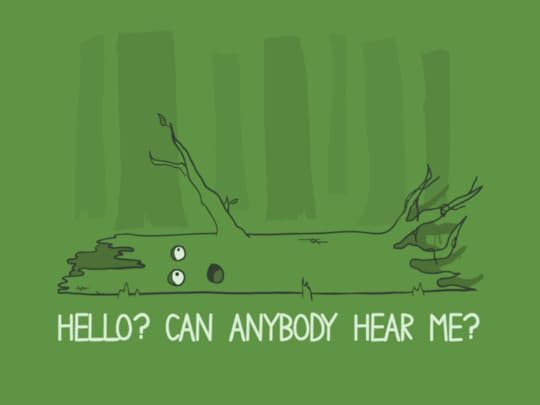
See what I'm getting at here?
Also when we "become" something, the equation changes. Possibility becomes inevitability. Maybe becomes definitely. So how I've become to define myself over the last years hinges on my work.
I'm not alone here. Most of us say, "I'm a teacher. I'm a writer. I'm a publicist. I'm a doctor ..."
It's not necessarily a bad thing. But I think it doesn't leave enough wiggle room. It makes things too black and white, cut and dry (should I go on with the cliches? That is, after all, my job, right?)
This bothers me. A lot. Because it feels a bit like we trap ourselves with our words. And if this thing we are doesn't work out, does that mean failure? It's kind of scary. Really scary, especially considering I have one of the least stable jobs in the world (ranked right up there with the engineer in charge of the Olympic symbol in Sochi's opening ceremonies).
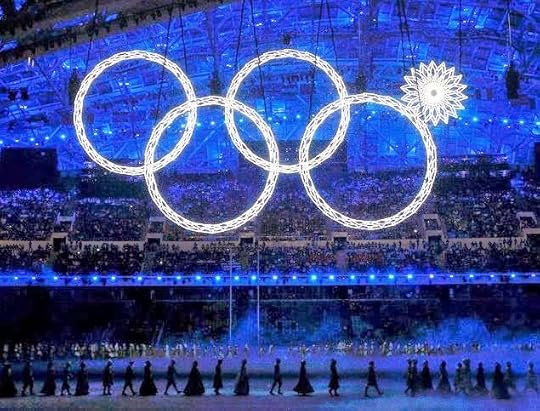
But being a bit of a word nerd, I've found the solution! (See .. I wasn't going to leave you there on the "define me cliff.")
I think it all boils down to a problem of noun versus verb.
*cue Rocky music*
And in this corner, we have the noun!
So I'm going to stop nouning myself. Instead of saying, "I'm a writer." I'm going to say, "I write." See how much lighter that is ... Wow. It feels better already.
I write.
I wife.
I run.
I cook (and nobody has ever accused me of being a chef).
I teach.
But you know what I am? I am Heidi. And I am a mom. That's my noun. That's a forever thing. And that's something I'm cool with. That's the definite and always -- being a mom. The rest, I'm going to verb it. Give me some space, okay?
The question struck me as being completely ... odd. My reaction was, "Of course."
That's just it, though. That was my reaction. And I'm still thinking about the question. And I realized something very bizarre. Sometime between writing my first article and my latest novel, I "became" a writer. Sure. Isn't that great?
Not so much. Because what if I don't want to write another book? Or. Let's be real. What many people see me as "being" is, in reality, "being published." There are thousands and thousands of writers out there who aren't published.
So, if you're a writer and not published, are you still a writer?
If a tree falls in the forest and no one hears it, does it make a sound?

See what I'm getting at here?
Also when we "become" something, the equation changes. Possibility becomes inevitability. Maybe becomes definitely. So how I've become to define myself over the last years hinges on my work.
I'm not alone here. Most of us say, "I'm a teacher. I'm a writer. I'm a publicist. I'm a doctor ..."
It's not necessarily a bad thing. But I think it doesn't leave enough wiggle room. It makes things too black and white, cut and dry (should I go on with the cliches? That is, after all, my job, right?)
This bothers me. A lot. Because it feels a bit like we trap ourselves with our words. And if this thing we are doesn't work out, does that mean failure? It's kind of scary. Really scary, especially considering I have one of the least stable jobs in the world (ranked right up there with the engineer in charge of the Olympic symbol in Sochi's opening ceremonies).

But being a bit of a word nerd, I've found the solution! (See .. I wasn't going to leave you there on the "define me cliff.")
I think it all boils down to a problem of noun versus verb.
*cue Rocky music*
And in this corner, we have the noun!
So I'm going to stop nouning myself. Instead of saying, "I'm a writer." I'm going to say, "I write." See how much lighter that is ... Wow. It feels better already.
I write.
I wife.
I run.
I cook (and nobody has ever accused me of being a chef).
I teach.
But you know what I am? I am Heidi. And I am a mom. That's my noun. That's a forever thing. And that's something I'm cool with. That's the definite and always -- being a mom. The rest, I'm going to verb it. Give me some space, okay?
Published on February 19, 2014 06:00
January 16, 2014
Mucho Rico ...
My youngest turns two in February and is in that mad and lovely language stage where everything is repeated, sentences are formed, and she's finally expressing herself. BLISS for parents. BLISS for her ... when she can get her point across.
Between two and seven or eight children are architects of language -- natural poets and they don't even have to work hard at it. Magic is made in their brains while they create expressions and words to fit their moods and what they feel. This is before the magic is beaten out by convention and blah blah blah.
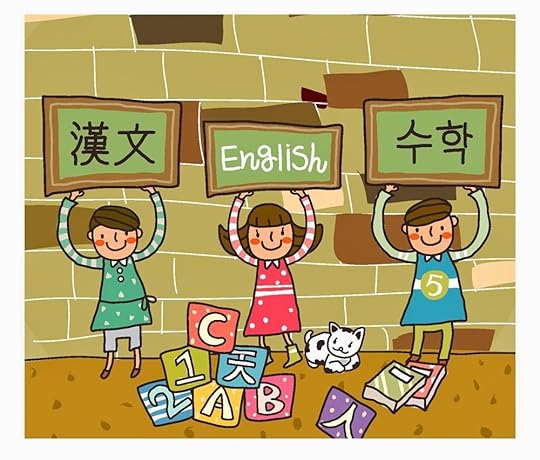
I LOVE how my oldest says "agdonal" instead of "diagonal" ... I love the way words get caught in their mouths and fill them up until they just have to SAY SOMETHING, no matter how garbled it may come out.
So E now says "mucho rico" when she loves something. Literal translation: much rich (much wonderful, much great). So if she's eating her favorite pasta dish, she says, "Ah, Mama. Mucho rico." Or when I tickle her back. "Mucho rico." Or if she's laughing with her sister, between giggles, she says, "A! Mucho rico."
For the word nerds out there, we see the flaw. You can't quantify rich, wonderful, great, these abstract adjectives with much. Much is for nouns. Quantifiable things.
But I've been thinking about it. A lot.
Why not?
Why not have much great? If I were to write down all the great in my childhood, I'd have so much, much great: sledding with my sister, playing softball, family dinners (I now understand how fortunate we were to have a family sit down to a table to eat together.), driving to North Dakota to visit my grandma's sunflower farm (My sister and I in the back of a Ford pickup truck, bouncing around pre-seatbelt laws), taking Basque dancing lessons (Okay, Yeah. I didn't like them. We were bribed with ice cream cones.), making friends that have lasted a lifetime ... much great.
 Grandma's Farm
Grandma's Farm
And my husband. This year we're going to celebrate sixteen years of much great: having a cow attack our tent while camping, getting picked up by a traveling circus while hitchhiking, falling out of a raft while going down a rapids called The Frog Blender (broken coccis, not much great, I guess... Much great story, though.), dancing in San Marco's square at midnight, eating tuna and pasta for a couple of months because that's all we could afford, daily laughter ... much great.
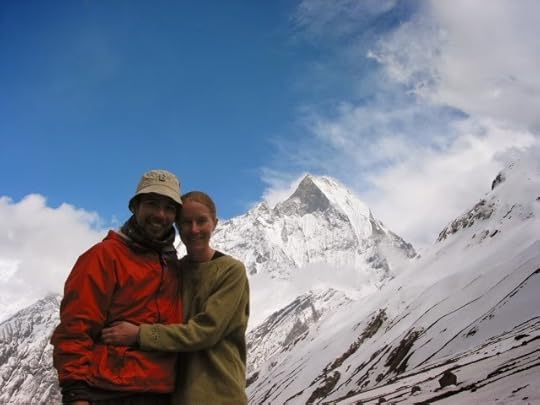 Annapurna Base Camp
Annapurna Base Camp
And the girls! There's is so much great with them. They gave me back TODAY when I was too busy to pay attention before. Shadow chasing, bubble-blowing, lap time storytime, giggles, scraped knees, finger painting, messes, so much great.
I feel almost embarrassed at times for how rich my life is. I guess it's because it's just ... much great.
So I'm starting to think my kids know more about language than me. The way they express themselves makes more sense. I never correct their language "blips" ... But I'm thinking I should start to adopt them.
Think about the much great in your lives. I'd like to hear about it.
Between two and seven or eight children are architects of language -- natural poets and they don't even have to work hard at it. Magic is made in their brains while they create expressions and words to fit their moods and what they feel. This is before the magic is beaten out by convention and blah blah blah.

I LOVE how my oldest says "agdonal" instead of "diagonal" ... I love the way words get caught in their mouths and fill them up until they just have to SAY SOMETHING, no matter how garbled it may come out.
So E now says "mucho rico" when she loves something. Literal translation: much rich (much wonderful, much great). So if she's eating her favorite pasta dish, she says, "Ah, Mama. Mucho rico." Or when I tickle her back. "Mucho rico." Or if she's laughing with her sister, between giggles, she says, "A! Mucho rico."
For the word nerds out there, we see the flaw. You can't quantify rich, wonderful, great, these abstract adjectives with much. Much is for nouns. Quantifiable things.
But I've been thinking about it. A lot.
Why not?
Why not have much great? If I were to write down all the great in my childhood, I'd have so much, much great: sledding with my sister, playing softball, family dinners (I now understand how fortunate we were to have a family sit down to a table to eat together.), driving to North Dakota to visit my grandma's sunflower farm (My sister and I in the back of a Ford pickup truck, bouncing around pre-seatbelt laws), taking Basque dancing lessons (Okay, Yeah. I didn't like them. We were bribed with ice cream cones.), making friends that have lasted a lifetime ... much great.
 Grandma's Farm
Grandma's FarmAnd my husband. This year we're going to celebrate sixteen years of much great: having a cow attack our tent while camping, getting picked up by a traveling circus while hitchhiking, falling out of a raft while going down a rapids called The Frog Blender (broken coccis, not much great, I guess... Much great story, though.), dancing in San Marco's square at midnight, eating tuna and pasta for a couple of months because that's all we could afford, daily laughter ... much great.
 Annapurna Base Camp
Annapurna Base Camp And the girls! There's is so much great with them. They gave me back TODAY when I was too busy to pay attention before. Shadow chasing, bubble-blowing, lap time storytime, giggles, scraped knees, finger painting, messes, so much great.
I feel almost embarrassed at times for how rich my life is. I guess it's because it's just ... much great.
So I'm starting to think my kids know more about language than me. The way they express themselves makes more sense. I never correct their language "blips" ... But I'm thinking I should start to adopt them.
Think about the much great in your lives. I'd like to hear about it.
Published on January 16, 2014 06:00


